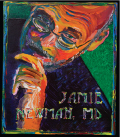The lost cohort
A fictional class for an MHA leads to some literal wayfinding.
For years I'd thought about going back to school, but I just could not find a way to do it. When I graduated from medical school, I thought about law school. That idea percolated in my head for a long time. After a close encounter with a practice management group, it seemed an MBA would be more appropriate. At times I even considered something practical, like welding or learning to drive a big rig, but obstacles always surfaced.
This year, after a decade or two of administrative duties, I decided it was about time to find out if I really knew what I was talking about. Perhaps some actual knowledge would trump sagely nodding my head during only partially comprehended meetings. Not that wisely applying a cranial extension and flexion maneuver, ideally coupled with a beard stroke or two, is not a formidable management technique, but a master's degree in health care administration (MHA) seemed to be the ticket, and easier on the cervical spine.

I was working with an extremely smart lawyer in my hospital's Medicare strategy unit who was in an MHA program, and she convinced me to apply. Likely she was tired of my ill-informed pontification, but she was kind enough not to say so. In the midst of an episode of noninfectious encephalopathy, I applied for the Executive Master of Healthcare Administration program at the University of Minnesota, and in a moment of admissions committee weakness, and blinded by some splendid CV razzle-dazzle, they accepted me to Cohort 6.
Immediately upon arrival, I wondered what I was doing there. I felt a little lost. Online learning, textbooks, many new people (some of whom were young enough to be my children), and lots of homework—why was I doing this? But soon I started to find my way. I was so happy to be with this group of new friends and colleagues, who spanned the entire spectrum of the health care universe.
As the first week progressed, we began an innovation session. After some intensive sticky-note-aversion therapy I dove into the process. Our assignment was to go to a major medical center and devise a method of way-finding. Perfect for me, since I was a guy who could drive cross-country without a map or GPS. We would observe and interview and brainstorm away, without jumping ahead to a conclusion.
Right. Of course I jumped ahead to a solution. I knew exactly where we should go with this project. I walked down the hallway, lost in thought, deeply concentrating on a road map to completing the assignment. I was thinking maybe a robotic parrot that could sit on your shoulder and squawk directions in your native language. Or not.
When it was time to meet back with all of the teams, I looked up from my phone and realized I had gone astray. I had misplaced myself. I did not panic. I was sure I had written down the meeting room number in my handy-dandy notebook. Which was in my briefcase. Which was in the closet in the meeting room.
Great. I was lost. I had to get back before they missed me and the bus left! How embarrassing. I stood outside the cafeteria entrance, took a deep breath, and headed out without a map.
A doctor walked by me. I was going to ask directions, but his eyes immediately went to his phone as soon as he saw me approach. His body language said “I'm too busy to help you.” My body language in response was more “Brooklyn” in nature. Two nurses walked by, glued to cell phones again. Frustrated, I decided I'd find my way myself. How hard could it be to find the administrative suites?
And so began my great trek through the bowels of the facility. I recognized some familiar wayfinding icons—the teddy bear for pediatrics, the cross for the emergency department, the fork for the cafeteria. But there was no symbol for administration. I trudged down dark hallways and poorly lit staircases. I found the morgue, and the janitor's secret smoke room, and 5 times I walked by the cafeteria. At least I wouldn't starve.
I was ready to give up. Maybe I would be doomed to walk these corridors forever, adrift like the Flying Dutchman. Finally I came to a lobby, and sitting in a wheelchair there was a patient. She had just come from a chemotherapy session and was resting in the sunshine. She took pity on me. I explained I was looking for the administration office, and I pushed her chair as she called out directions and led me there, like a lost lamb. I would forever be in her debt, but she said the pleasure was all hers.
I had found my way back to my group. But the room was empty. A secretary walked in and I explained which people I was looking for.
“That group of students from the U?”, she replied. “They all went to the cafeteria.”
I walked into the cafeteria conference room. “Good thing you made it here,” I told them. “I was worried you might be lost.”



